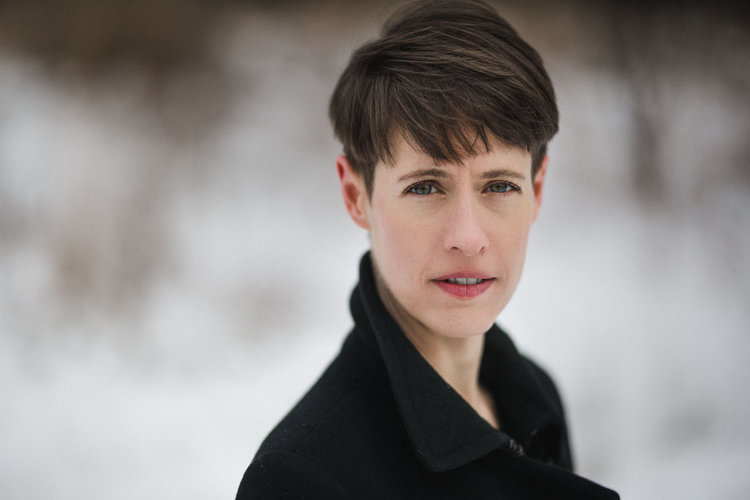In our 2019/20 Season, we are exploring how "old" can meet "new." This theme runs across our season in many ways, including six short new works by living composers written to complement the programs.
We are delighted to introduce Cecilia Livingston, whose new work for wind sextet will premiere in Gone with the Winds this January.
Tafelmusik: Tell us a little about yourself, and how you started composing music.

I’ve never fit the typical “young composer” narrative: alas, no baby genius moment, composing my first masterpiece on a Fisher-Price keyboard! I really started composing in university: I was in a music education program, but realized that the composition assignments in my theory classes were what I couldn’t wait to work on. I switched degree programs and by the end of my undergrad I figured this was the direction for me.
Now I split my time between Toronto and London (UK), where I’m composer-in-residence at Glyndebourne Festival Opera. In my spare time (ha ha, a concept unknown to composers!) I like running, eating other people’s cooking, and watching dreadful reality TV that has nothing to do with classical music.
TM: What do you hope the audience will take away from the composition you are writing for Tafelmusik? And the flipside, what do you hope to take away from the performance of your work?
CL: I hope audiences enjoy it! If they smile, I’ll be happy: it’s a light-hearted little piece, and I hope that anyone in the audience who might be a bit wary of contemporary music has a moment when they think — “oh wait a minute, that was kind of delicious!”
I’ve been attending Tafelmusik’s concerts since I was tiny. My mother adores renaissance and baroque music, and scenes from my childhood include pulling up to red lights on the way to my elementary school with Monteverdi blasting out the windows. Monteverdi and Raffi and Fred Penner. And Motown. I can sing large sections of Monteverdi’s Orfeo for you, both the vocal parts and the instrumental lines!
But to be serious for a moment: to work with Tafelmusik’s amazing musicians, and to learn from them about their instruments, their approach to the repertoire they specialize in, and then to hear them bring life to what I’ve dreamed up while thinking about them day after day… that’s magical. And a beautiful reminder that baroque music is very alive, part of such a long, ongoing flow of music: maybe those long-dead composers sent fewer of their persnickety bassoon questions by email (thank you Dominic for all your insights!) but the great masters had their premiere performance jitters too. It’s an encouraging thought.
TM: What was the first composition you wrote? What / How / Why?
CL: A totally awful theme and variations piece for a teen composer masterclass. It took me nearly a decade to try again. Talk about wooden. That was a BAD piece. Still, one starts somewhere. Whenever I doubt a piece now, I remind myself that it can’t possibly be as bad as that piece!
TM: What top tracks (any genre) would we find on your Spotify playlist?
CL: Tons and tons of Radiohead. Lots of Reich, Crumb, Bach… and lots of opera. And Irving Berlin. I’ve been on a Messiaen kick too lately. I’m pretty omnivorous.
TM: What more can Canada do to increase the awareness of our rich heritage of music-making?
CL: Be proud of what we do, and be bold about sharing it and supporting it. Tafelmusik is a great example of this: internationally recognized excellence also celebrated in Canada. With this new set of commissions Tafelmusik is showing that excellence can be expansive, that audiences can trust new adventures. It brings new life to programming, and it’s an opportunity for everyone to learn from everyone. New work is always a risk; what a great moment Tafelmusik has created for all of us to remember that every art work was new work, all composers were living composers, and that music is such a fluid, living thing.
Cecilia Livingston introduces Gone with the Winds
Taking its title from the title of this program, this piece is a bit tongue-in-cheek: it plays with the repeated note figures of Mozart's K.388 and Beethoven's op. 71 (also on this program), but pushes those gestures into more recent minimalist musical worlds, while hinting at the famous “Tara's Theme” from Max Steiner's score for Gone with the Wind. Laura Millard's artwork Contrails, which Tafelmusik chose to complement this program, suggests the lightness I hope my piece will offer too. Tafelmusik's program for this concert takes the Harmonie ensemble, with its juke-box covers of popular opera music, as a point of departure; Steiner had formative experience conducting opera and operetta, and his score for this gloriously “operatic” (melodramatic) movie, with such a very appropriate title, offered an irresistible musical joke for the end of the piece.
Cecilia Livingston is composer-in-residence at Glyndebourne Festival Opera (UK), where her work is supported by the Canada Council for the Arts and builds on her 2015–17 Fellowship at American Opera Projects in New York. Winner of the Canadian Music Centre’s 2018 Toronto Emerging Composer Award and the 2018 Mécénat Musica Prix 3 Femmes for female opera creators in Canada, her music has been heard at Nuit Blanche, the 21C Festival, World Choir Games, and with the Toronto Symphony Orchestra. Her current projects include the opera Terror & Erebus for Opera 5 and TorQ Percussion Quartet, as well as new work for Glyndebourne, and a song cycle with poet Anne Michaels.
Photo credit: Self Limited Photography
